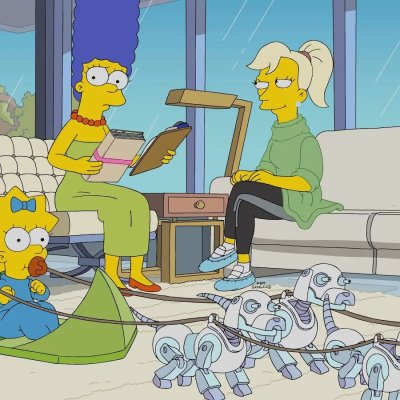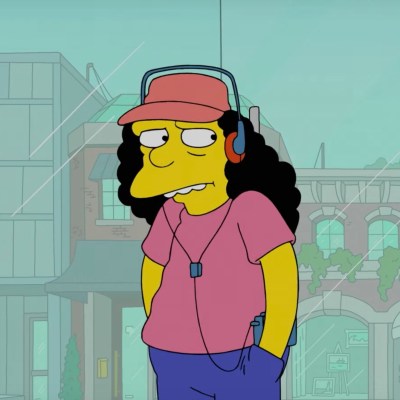The Simpsons Season 31 Episode 19 Review: Warrin’ Priests (Part One)
The Simpsons deliver the first in a two part episode and benefit from the extra time.

This The Simpsons review contains spoilers.
The Simpsons Season 31 Episode 19
The Simpsons season 31, episode 19, “Warrin’ Priests (Part One),” promises, or threatens to be an epic. The episode is named for the Russian masterwork War and Peace. Leo Tolstoy’s prose poem about the French Revolution runs almost 600,000 words. But let’s be honest. A lot of those words are used more than once. This will be a two-part story, which The Simpsons has done more than once. The plot focuses on the Reverend Lovejoy being out-pulpeted by a hipper and more charismatic pastor. This is a conflict the series has explored quite a few more times than once.
By dragging out a premise which has been done before over two weeks, The Simpsons can either make this interesting or rapture us now. Even the saints have been known to walk out of Timothy Lovejoy, Jr.’s ministrations and making an audience sit through a double dose of the First Church of Springfield could be like sitting through two sermons on a Sunday. Luckily, there’s a catch, and it’s not just the one in Lovejoy’s throat.
There’s a new testament? Bode, who answered an ad Helen Lovejoy placed on ChristsList, makes his entrance like the first time you see Jebus in a Jesus movie. We don’t see his face right away, but we know he exudes beatific magnificence from the moment Chief Wiggum first lays eyes on him. He even offers to give him his gun, something the top cop probably rarely does, but it makes it seem he never does. Bode seems perfect, he’s got Masters in Divinity and enough arm for a group hug. His very presence threatens the Reverend from every angle.
Bode moves from the hotel across the street from Springfield’s tire fire to the top of Lovejoy’s beloved train set. This leads to a funny sequence in miniature, as the reverend toys with the younger minister before condescendingly showing him the ropes. This leads to homeless foot washing, made better by the promise of pedicures, and a Bingo bashing, which is made better by Grandpa Simpson playing off a monthly calendar.
The Western Branch of American Reform Presbylutheranism First Church of Springfield is more than a place of worship. It is also a place for gatherings, and one of the best early gags shows how less-than-reverent some of those who flock there are. Krusty the Clown, who is not a Presbylutheranist, outs all the local characters who belong to his Alcoholic Anonymous meeting but the less than mysterious Disco S, who is apparently quite a mess. When Marge and Homer go for counseling, the Church advertises it on the marquee sign. They are really desperate for parishioners.
Bode’s initial sermonizing prowess comes quickly. A little too quickly. When he first hits the pulpit, he’s playing to a house that’s about a quarter full, and the parishioners are just waiting for it to be over. Even the church organist celebrates the promise of an early release and I’m pretty sure she’s paid by the note. The only people who want to be there are Jimbo and his date, who bought into the idea that church is the safest place to have sex because it’s a natural contraceptive. But by the end of his sermonizing the place is almost packed.
Bode’s introduction is very very meek, Jesus would’ve loved it. He leaves two notions on the flock. On the surface they appear to be divergent. Homer sees the young pastor, in his white shirt, and imagines this is what a real Jesus concert must have been like. Ned sees a devil playing guitar with his tail. So ultimately there’s something for everyone.
Millhouse is the first person to see the burning bush in the chapel, but his personal story gets hung in the air. Bode’s sermon is all inclusive, he recognizes Barney for his dryer accomplishments. Even Mr. Burns gets a double reprieve, but that’s also what you get for procrastinating. Homer is already imagining the merchandise before he starts a call the whole church joins in on. Then he does another one and by the time the whole congregation is chanting stupid Flanders, we remember the power Homer wielded as a sports mascot. And while this kind of stuff may not play in Capital City is certainly plays at the Springfield Church.
Lovejoy’s brand of spiritual enlightenment has only dimmed since its Spanish Inquisition heyday, and now even his holy water reverts to tap. Bode’s more inclusive, even his name is from the Buddha, which appeals to Lisa as much as his knowledge of jazz chords. Lovejoy could barely make a bar chord on the squeaky strings of his electric guitar when he tried to invigorate his palpitations a few seasons ago. Lisa even thinks Bode tells the best meditation joke, albeit the only meditation joke she’s ever heard.
Lisa’s transcendent experience doesn’t go for the sitar-filled psychedelic cliché. She is reimagined in a sequence of differing artistic renderings, from scissor-cutouts, to crayon doodlings to cubism, before she hits a computerized version of some kind of Akashic records where all you have to do is push a button to meet god. It’s kind of spooky the young reverend knows about the button, though.
“Are you sure you want to go to Michigan,” the state border sign reads as Lovejoy goes off in search of dirt on the new guy, and I’m paraphrasing. But his exit leaves a hole in the community only a local barman can fill. Moe puts on a makeshift congregation which would be perfect for Fat Tony’s crew. He interprets the gospel with baseball hat miracles and offers redemption or else.
We haven’t seen a two-parter since we learned who shot Mr. Burns, and maybe they should do this more often. The buildup is steadier throughout. We get more focus on characters, and secondary characters get noticed in a bigger way. Because this is Springfield’s most reverent, it affords more time to build up the sweetness of the community. It’s like some kind of religious experience. The longer format could have worked on several episodes this season, which has been paying attention to finer details. Episode 9, “Todd, Todd, Why Hast Thou Forsaken Me?,” which was also a religious-themed entry, would have benefited from the extra time.
After 31 seasons it’s tough to come up with a new comic premise, but by playing with form, The Simpsons add layers to perennial problems. They may never retain anything from the lessons they’ve learned and ultimately Springfield must return to status quo but they can fill in the finer points. This has been consistent the whole season. The episode doesn’t end on a cliffhanger, except the aforementioned Millhouse, but at a natural breaking point in the suspense. “Warrin’ Priests (Part One)” leaves us anticipating a showdown, but not too worried about it. The leisurely pace and character building makes this measured success.
Chalkboard: How did the boy get me to do this?
Keep up with The Simpsons Season 31 news and reviews here.


